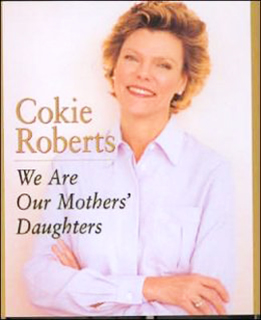|
The Library’s Book Recommendation: We Are Our Mothers’
Daughters
By Rhonda Sewell,
Library Media Relations Coordinator
The Truth Contributor
The Toledo-Lucas County Public Library is excited to welcome
New York Times best-selling author and renowned
political correspondent and commentator Cokie Roberts
to The Blade and Library’s Authors! Authors! on
Wednesday, September 3 at the Stranhan Theater, 4645
Heatherdowns Blvd.
|
 |
|
The Library would like to recommend Cokie Roberts’ book
We Are Our Mothers’ Daughters”– this book
examines the nature of women’s roles through the lens of her
own personal experience. During her September appearance in
Toledo, Roberts is expected to discuss her own distinguished
career, politics, the upcoming election and her books.
Below is an Amazon.com review by Brangien Davis:
In We Are Our Mothers' Daughters, Roberts poses what
has long been a real doozy: "What is a woman's place?" As
you might guess, her answer is manifold, reflected by the
table of contents, which reads like the Career Day schedule
at a progressive girls' school: Sister, Politician, Consumer
Advocate, Aunt, Soldier, First Class Mechanic, Friend,
Reporter, Civil Rights Activist, Wife, Mother/Daughter,
Enterpriser. Roberts makes no claims about this being
groundbreaking research, or even an exacting investigation,
rather, she explains that these are simply her own stories,
and those of women she has come in contact with at different
times and places in her life.
Having graduated from Wellesley College in 1964, Roberts
explains that the women of her generation were pioneers in
many ways--especially when it came to career and workplace
issues: "We were the first women at almost everything we
did, and most of us often had the experience of being the
only woman in the room."
Accordingly, many of her essays are political in nature: the
passage of the 1964 Civil Rights Act (which included "sex"
as a prohibited discrimination category by virtual
accident); the work of consumer advocate Esther Peterson;
and the history of women in the military. But for Roberts,
it's clear that the personal is political, and many stories,
while not overtly activist--her older sister's death, her
circle of female friends, and her experiences as a wife,
mother, and reporter--reveal the importance she places on a
united community of strong women.
Using clean, compelling language throughout, Roberts
compiles these different stories to reveal a thread of
continuity running through the fabric of women, summarizing,
"We are connected throughout time and regardless of place."
She ends with a message of encouragement for young
women--that we need only look as far as our foremothers for
inspiration. |